|
|
|
Sort Order |
|
|
|
Items / Page
|
|
|
|
|
|
|
| Srl | Item |
| 1 |
ID:
133536
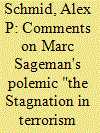

|
|
|
|
|
| Publication |
2014.
|
| Summary/Abstract |
Marc Sageman's lamenting about the "Stagnation in Terrorism Research" stands in stark contradiction to my conclusion in the Routledge Handbook of Terrorism Research (2011) that "Terrorism Studies-despite many shortcomings-has matured" and that "Terrorism Studies has never been in better shape than now." 1 While I agree with much else of what Marc Sageman says, there are a few points I disagree with. To begin with the notion of "stagnation": Terrorism Studies began, with few exceptions (Crozier, 1960; Thornton, 1964; Walter, 1964, 1969; Gaucher, 1965), 2 in the 1970s. Yet there had never been a period of real bloom in the 20th century-something which logically should precede the alleged stagnation after 9/11. As Andrew Silke noted in 2006:
|
|
|
|
|
|
|
|
|
|
|
|
|
|
|
|
| 2 |
ID:
133541
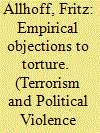

|
|
|
|
|
| Publication |
2014.
|
| Summary/Abstract |
Those who support torture in ticking-time-bomb cases are often criticized as failing to consider empirical objections to torture; however, torture's critics often wield this charge uncritically, doing little more than throwing out platitudes without considering the role of those platitudes in the dialectic. I agree with the critics that more empirical engagement is owed than is typically on offer, but deny that such engagement vindicates their position. This article therefore considers various stock objections to the actual use of torture, while ultimately arguing that those objections fail to undermine the use of torture in exceptional cases. In particular, we will consider the efficacy and reliability of torture, the institutional requirements for torture, the nefarious spread of torture, and whether there are better alternatives to torture. In each of these discussions, let us frame them against the associated contentions made by critics regarding the inapplicability of ticking-time-bomb cases to the real world. The last two sections of the article consider where the burden of proof falls in this debate and, in particular, whether the proponent of torture needs real-world ticking-time-bomb cases to defend exceptional torture, as well as what such cases might be.
|
|
|
|
|
|
|
|
|
|
|
|
|
|
|
|
| 3 |
ID:
133535


|
|
|
|
|
| Publication |
2014.
|
| Summary/Abstract |
Have you heard the story about the Englishman lost in an Irish mist trying to find the route to Limerick? He reaches a country crossroads, and asks an old man for directions; after much thought the old man's answer is, "If I were you I wouldn't start from here." From Sageman's account, you might in many ways infer that's the story of much contemporary terrorism research, and is, it seems to me, the unstated fundamental assumption behind his paper-if we had the freedom to start from scratch, if we were designing an area of study to investigate how violence is used to do things to influence political decision making, we'd probably want to conduct ourselves in a different way than we have. But we are where we are. Whether we like it or not, in studying terrorism and the terrorist, we engage with a world in which governments, officials, and politicians largely define the agenda (and keep changing it), set the rules for risk tolerance, and to a large extent control the money and through the choices they make direct research agendas.
|
|
|
|
|
|
|
|
|
|
|
|
|
|
|
|
| 4 |
ID:
133542
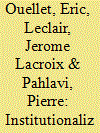

|
|
|
|
|
| Publication |
2014.
|
| Summary/Abstract |
A number of observers have expressed serious concerns that Al-Qaeda in the Islamic Maghreb (AQMI), as it expands in the Sahel, may become strong enough to be a threat to Europe and carry on the global mission of Al-Qaeda as conceived by bin Laden. This fear seems unwarranted. Using institutional analysis to study the AQMI behavioral fluctuations over the last decade, this article argues that AQMI's need to find a compromise between external and internal legitimacy has constrained its behavior. The affiliation of the Algerian terrorists with Al-Qaeda was in many ways a marriage of convenience that created a number of internal contradictions. At the cognitive level, implicit Algerian nationalism to rid the country of its corrupt regime remains at odds with pan-Islamic views shared by Al-Qaeda's leadership. At the normative level, indiscriminate suicide bombing supported by Al-Qaeda is abhorrent to many Algerian terrorists, who construe their mandate in the spirit of the Algerian war of independence where it is their duty to protect civilians. These and other contradictions prevent AQMI from developing a coherent political agenda and thus it is less likely to engage in a long-term conflict against European societies.
|
|
|
|
|
|
|
|
|
|
|
|
|
|
|
|
| 5 |
ID:
133540
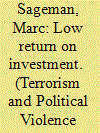

|
|
|
|
|
| Publication |
2014.
|
| Summary/Abstract |
First, I would like to thank David Rapoport for making this exchange possible. It is an important aspect of scholarly debate that has been missing from terrorism research. I also wish to thank the authors of the comments on my article on the stagnation on some part of terrorism research. I appreciate their kind words about my past work. Such praise coming from colleagues I truly esteem, and from whom I've learned so much, means a lot to me. However, I would also like to correct their impression about my mood. Far from being gloomy or pessimistic, I took to survey the area of terrorism research in order to see where we are and what we should do as a collegium. What should we do to improve terrorism research? Let me address each of the commentators in the order I read them.
|
|
|
|
|
|
|
|
|
|
|
|
|
|
|
|
| 6 |
ID:
133544
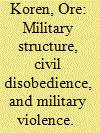

|
|
|
|
|
| Publication |
2014.
|
| Summary/Abstract |
In this article, I argue that factors inherent to the structure of a military organization and their relationship with the political leadership play a role in the organization's tendency to perpetrate violence against civilians during civil disobedience campaigns. To examine this hypothesis, I conducted a three-phased statistical analysis on a database containing 97 campaigns that took place between 1972 and 2012. In the first phase, I examined the relationship between military centric factors and violent crackdowns. In the second phase, I examined the relationship between military centric factors and mass killing. In the third stage, I examined the relationship between two specific types of discrimination in the military and mass killing. I found strong evidence supporting the hypothesis mentioned above. High-risk militaries that served a militarized regime, contained loosely regulated or indoctrinated paramilitaries, and discriminated against the protesting group, were much more likely to perpetrate violence against civilians during civil disobedience campaigns than low-risk militaries. The conclusions of this study suggest that further examination of the military's role in perpetrating violence against civilians during protests and conflict may provide some novel findings.
|
|
|
|
|
|
|
|
|
|
|
|
|
|
|
|
| 7 |
ID:
133537


|
|
|
|
|
| Publication |
2014.
|
| Summary/Abstract |
Anyone who cares about both the national security threat arising from transnational al Qaeda-inspired terrorism and the need to develop a measured, effective response to this threat owes a great deal of gratitude to Marc Sageman. He was an early teller of inconvenient truths. As he notes in his essay, the tumultuous years following 9/11 were marked by the rise and mass dissemination of wild, ahistorical, and anecdote-based theories about the causes and possible solutions to violence motivated by the virulent ideology propagated by Sayyid Qutb in the 1950s and tragically brought to our shores by Osama bin Laden. Sageman insisted, however, that theory must be supported by evidence. He presented the facts as he saw them without regard to those he was undercutting on each side of the political spectrum. Over a decade after 9/11, his work has withstood the test of time and had a significant positive impact on our understanding of why al Qaeda attacked us and our policies for confronting this threat.
|
|
|
|
|
|
|
|
|
|
|
|
|
|
|
|
| 8 |
ID:
133539


|
|
|
|
|
| Publication |
2014.
|
| Summary/Abstract |
Dr. Sageman makes a good point that despite the influx of government funding in the last decade, terrorism scholars have not been able to answer what he calls a "simple question"-what leads a person to turn to political violence? But Dr. Sageman's conclusion that scholars' inability to answer this question is evidence of stagnation in the field is incorrect. First, most scholars who study terrorism are addressing risk factors for terrorism at the level of societies, not individuals, so it is hardly surprising that there is no "consensus answer" to Dr. Sageman's question. Second, the question Dr. Sageman poses about individual level decision-making is not at all simple to assess. It is difficult to make gross generalizations about what leads individuals to do what they do in any area of life; difficulty in answering this question is not unique to terrorism experts. Consider analogous questions about individual decision-making with regard to other life choices. Despite significantly more than a decade of study, neither scientists nor humanists have been able to explain, ex ante, what leads a person to fall in love, to murder another, or to choose a particular career path (as a terrorist, or otherwise). A detailed study of an individual's life history might enable scholars to propose ex post hypotheses as to why that individual chose a career as a terrorism expert rather than as a terrorist, but even then, experts from varying disciplines (including psychiatry) would focus on different parts of the problem, seen through different lenses. It is not clear why Dr. Sageman holds terrorism scholarship to a standard that no other group of scholars aiming to understand and predict human behavior has yet been able to achieve.
|
|
|
|
|
|
|
|
|
|
|
|
|
|
|
|
| 9 |
ID:
133545


|
|
|
|
|
| Publication |
2014.
|
| Summary/Abstract |
The Black September events in Jordan in 1970 are an example of the conflict the Palestinian issue presented for monarchic regimes. On the one hand, wealthy regimes such as Saudi Arabia and Kuwait wanted to assist the Palestinians in their struggle against Israel, but on the other hand, the moment they understood that siding with the Palestinians could weaken their regimes, they renounced their support. This article, therefore, emphasizes the importance the monarchic regimes in the Persian Gulf attributed to their own stability, and the influence that issue had on their policies within the Arab world.
|
|
|
|
|
|
|
|
|
|
|
|
|
|
|
|
| 10 |
ID:
133538
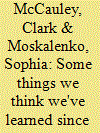

|
|
|
|
|
| Publication |
2014.
|
| Summary/Abstract |
It is a pleasure to have this opportunity to respond to a distinguished colleague's concerns about the progress of terrorism research since the 9/11 attacks. Marc Sageman sees little progress and identifies numerous impediments to research, notably including lack of good data and over-reliance on formal modeling
|
|
|
|
|
|
|
|
|
|
|
|
|
|
|
|
| 11 |
ID:
133534
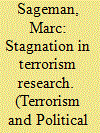

|
|
|
|
|
| Publication |
2014.
|
| Summary/Abstract |
Despite over a decade of government funding and thousands of newcomers to the field of terrorist research, we are no closer to answering the simple question of "What leads a person to turn to political violence?" The state of stagnation with respect to this issue is partly due to the government strategy of funding research without sharing the necessary primary source information with academia, which has created an unbridgeable gap between academia and the intelligence community. This has led to an explosion of speculations with little empirical grounding in academia, which has the methodological skills but lacks data for a major breakthrough. Most of the advances in the field have come from historical archival research and analysis of a few field interviews. Nor has the intelligence community been able to achieve any breakthrough because of the structure and dynamic of this community and its lack of methodological rigor. This prevents creative analysis of terrorism protected from political concerns. The solution to this stagnation is to make non-sensitive data available to academia and to structure more effective discourse between the academic and intelligence communities in order to benefit from the complementary strengths in these two communities.
|
|
|
|
|
|
|
|
|
|
|
|
|
|
|
|
| 12 |
ID:
133543
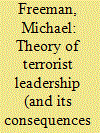

|
|
|
|
|
| Publication |
2014.
|
| Summary/Abstract |
States often target terrorist leaders with the belief that the leader's death or capture will cause the terrorist organization to collapse. Yet the history of this strategy of "leadership targeting" provides a mixed record-for every example of effectiveness, there are similar examples of ineffectiveness. The central question of this article is: what makes a terrorist leader important? Specifically, what does a terrorist leader do that no one else can do (or do as well) for the organization? To answer this question, I develop a theory of terrorist leadership that argues that leaders might potentially perform two main functions: they can provide inspiration and/or operational direction (or not for both). I also theorize as to how and why the provision of these functions changes over time as the organization itself changes. The consequences for leadership targeting flow naturally from this theory-when leaders provide these functions to the organization, leadership targeting is most likely to be effective. Case studies of Algeria, Peru, and Japan offer insights into why some cases of leadership targeting were effective and why others were not. The conclusion extends this model with an analysis of al-Qaeda's prospects after the death of bin Laden.
|
|
|
|
|
|
|
|
|
|
|
|
|
|
|
|
|
|
|
|
|